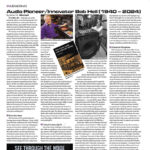Once upon a time in the kingdom of Hertz, a small duchy in the southwest corner of the Land of Ohm, a rebellion was brewing among the foot sol-diers who made the kingdom’s many events sound excellent. These foot soldiers once were seen as the equal of the kingdom’s high priests, as their knowledge and expertise allowed them to make even the rattiest of sound systems sing like a choir of angels. But they had recently seen their status in the kingdom drop precipitously as some in positions of power in the kingdom began to suggest that they could be replaced by a new magic called digital technology.
“Why,” these power brokers cried, “must we pay these lowly mixers to do a job that can be handled by a mere apprentice armed with a pre-setup digital console? For we are jealous of both their knowledge and the fact that they mock our ignorance and spend their off days in the company of strippers while we are stuck in the shop.”
And, indeed, some in the community of mixers found themselves out of long-term gigs as their expertise and experience was translated into mere data and handed to an apprentice earning far less gold for his efforts.
The Road Only Appears to Be Paved with Good Intentions
From the earliest remembered times, those who could summon excellent sound to entertain the masses were held in high regard, and their art was little understood by most. Armed with only the most basic of tools, but fortified with enquiring minds and excellent ears, these honorable knights were able to make sound for thousands with components never designed for such purposes. Their abilities were so prized and so little un-derstood by those not of their order that their services were valued greatly, and some in their ranks were well compensated, indeed.
However, the tools that the mixers used to ply their trade became more and more complex and costly, until none but the most wealthy among them — or those willing to gamble on where the future would lead — were able to purchase the largest of these tools. Indeed, all mixers had a cache of special tools they employed to achieve their desired results, but these tended to be the smaller and less costly of the tools of their trade.
To procure the larger items they needed, the mixers and those who employed them turned to a small group of merchants who rented the gear to those who needed it. These merchants often employed mixers and technicians as well. There were many of these merchants and, indeed, many mixers crossed the line to rent gear themselves and start their own rental companies. But there was one merchant — the Central Scrutinizer — who was greatly feared because his great size made him vexingly powerful. All were careful not to offend the Central Scrutinizer.
Meanwhile in another kingdom called the Valley of Silicon, another band of the tech priesthood was perfecting a machine that could do computations once only able to be completed by the cleverest of humans. It could do these computations many times faster than its human inven-tors and could store the outcome of these formulas for instant recall at any time.
Over a short period, this machine became smaller and less costly and made its way throughout the kingdom, as once complex tasks were re-duced to a series of computations that this new device could solve and store. Soon everyone used this machine in their daily tasks until the machine became just another part of the lives of the people. This came to pass even in the kingdom of Hertz.
The Evil Plan is Revealed
In Hertz, the honorable mixers resisted the new machine for some time, complaining that while the smaller size of the device and the ability to store their sacred settings was nice, it was impossible to get the same sound from this machine as from the tools they held dear for so long. But behold, the Central Scrutinizer and his minions began convincing Those Who Pay the Bills that the new device would save them much gold due to its smaller size and would require less space, making it less costly to transport and allowing Those Who Pay the Bills to sell more seats and earn more gold.
Behold that, for many years, mixers had cleaved to a tradition called “zeroing out the board.” This meant that at the end of each show, they would remove all of their sacred settings and return the console to a neutral state. This served the dual purposes of leaving a clean slate for the next mixer to use for building his own mix, and it protected the sacred settings of each mixer. But with the new machine, each mixer could save his sacred settings in a different place and easily return to them for the next show. What had once taken hours was accomplished in mere seconds. Little did they know that this convenience would give the Central Scrutinizer even greater power.
Soon most of the honorable mixers were using this new machine, often against their own wishes. But in a short time, most began to appreciate the ability to recall their sacred setting with the push of a single button. Meanwhile, the Central Scrutinzer and his minions began to procure the data that represented the sacred settings of each mixer for “archiving” purposes. Soon the mixers began to see that the Central Scrutinizer could take that archive and hand the sacred settings to an apprentice and no longer have need of the mixer’s services. When a mixer approached the Central Scrutinizer and asked that his sacred settings not be given to another who lacked the experience to create such settings himself, The Scrutinizer laughed and banished the mixer from his presence.
The Revenge of the Mixers
But behold a group of the mixers — even those who had once been counted as minions of the Central Scrutinizer — began to see that they were being played for chumps, and that their knowledge and expertise were being “borrowed” by others who were often not worthy. And they were vexed, crying out, “Whose mix is it anyway?” And the Central Scrutinizer just chuckled and counted his gold.
But some mixers came to realize that those things that could be saved in the machine could also be deleted. Soon, many of them were armed with a new weapon called a USB Key. This powerful weapon allowed the mixer to save his sacred settings to a device that only he controlled and allowed him to delete the settings from the machine at the end of each show. Armed with this new weapon, some began to fear the Central Scrutinizer less, suggesting that he commit unnatural acts upon himself and vowing to rent their gear from others.
While the Central Scrutinizer retains much of his former power, many question his worth and the battle continues to this day.
The Moral If you are a mixer, remember that intellectual property law can get pretty gray, and that if you don’t protect the mix you have developed — often over the course of several tours — than you may have little recourse if someone else takes it and decides they don’t need you on the bus.
If you run a sound company: The next time a digital console comes back after a show with its memory wiped, and you need to spend time re-uploading basic patching and other settings, thank the Central Scrutinizer.



